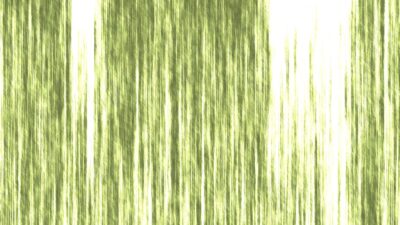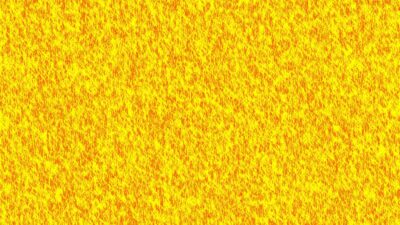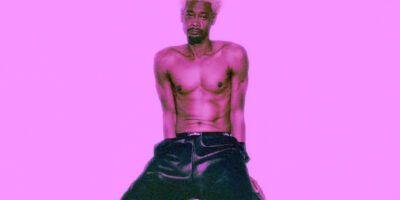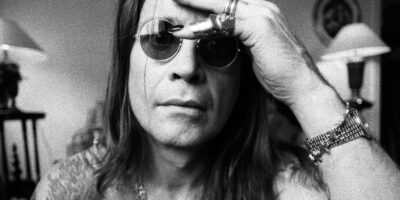It used to be my job to hate Radiohead.
No one specifically gave me money to laugh at Thom Yorke memes or criticize Jonny Greenwood’s guitar playing. But, like any good journalist, I cultivated a beat of sorts as the lone, unwavering denier of Radiohead’s radiant brilliance. Whether I was talking about their infinite meh-ness via video or torturing myself by listening for an entire day, there was a certain novelty in my position as being vehemently anti-Radiohead—indie music journalism has few immutable truths, but a clear and resounding love for the band is accepted practice. My “status” gave me a certain credibility; if my job was to question the “goodness” of music, then why can’t we call into question the rock gods themselves? I’m not sure most folks even noticed, but I wore my disdain and disinterest as a badge of honor. It made me unique and thoughtful and probably all sorts of tedious, but then again isn’t that the point of it all?
This story is all the more tantalizing given what some might call a recent come-to-God moment. Maybe it wasn’t exactly the curtains of the universe falling away, basking at the band’s altar unburdened by past shortcomings and silly contrarian ways, but I have found a profound comfort and lingua franca in Radiohead these days—it’s become greater than any religious awakening.
The last few years have been a profoundly transformative experience emotionally, mentally, and spiritually, and I have come to this realization through robust loss and understanding. It was not gifted to me, but I felt like I’d wandered the desert and finally found some kind of truth. And even if that’s all overblown hyperbole, it feels real, and it’s among the most earnest realizations I’ve felt in these deeply challenging times. In a way, Radiohead has become a kind of icon for the profoundly personal journey I’ve undergone, and they stand not as some grand achievement, but a kind of perspective I didn’t know I’d ever needed.
—
It all sort of starts with COVID.
That’s not entirely novel, as the last two-plus years have basically been a series of realizations and begrudging acceptance on a global level. For me, it’s been a time to really see the world’s true anger and overt nastiness. I’ve lived through the start of the War in Afghanistan, a global housing crunch, and even Occupy Wall Street; none of those have anything on how the pandemic has exposed the worst, base tendencies of humanity. From bucking science for horse dewormers and fake vaccine passports to families breaking apart over cloth masks and a willing embrace of ignorance as a personal salve, this pandemic has been powered by a deep existential rage. There’s a certain lizard brain-level anger, for instance, in hosting COVID parties that nothing in my life prepared me for. In turns, it’s not just everyone else—I’ve felt a rage that may have been in me all along swell up in size and ferocity. What this series of unending indignities has taught me is just how much anger resonates within me and how that feeds into and from the world at-large. It’s a baseline emotion in the way I thought happiness or curiosity might be. I see an angry world because deep, dark red is that thing that feels that most resonant.
I think Radiohead is equally angry. COVID taught me rage isn’t a line of Proud Boys protesting mandates with shitty polo shirts and racist propaganda (but it can be); rage is a society that lets that kind of hate permeate with quiet approval. I think about a song like “Everything in Its Right Place,” and how it feels practically infected with rage. It’s the POV of a very bitter man, one slurping on lemons and blind to most of the world’s hues, telling himself over and over that there’s a place for it all in the known universe. But I don’t know who he’s fooling. While there’s a kind of beauty and religious ecstasy to the song, it’s very much someone trying to shape the world in their own ideals and incessant need for congruent simplicity. Maybe he can do just that, but what he may be left with is forever trying to fill the gaps that remain between his vision and the world itself. There’ll always be something out of place, and those knicks cut deepest. COVID has made this separation painfully real.
“Pyramid Song” is one that I’ve come to think of as among the most beautiful songs in the world. But again, as COVID taught me, the emotional highs can be born out of, or irredeemably connected to, opposing lows. The song is about acceptance and this idea of letting go and embracing something bizarre and fantastical in order to transcend. But the song’s mantra (“There was nothing to fear and nothing to doubt”) feels just as much like an acceptance that uncertainty and panic hold no heft, and while that means something pure to certain folks, it leaves just as much possibility for sheer anger. The person at the center of this song is leaving their world behind and maybe that feels promising, but it’s just as much about recognizing what’s been left behind and grappling with that which you’d have to abandon. Rage isn’t always loud, but it’s a quiet shattering of what you knew and how you go about whatever comes next.
—
COVID has become proof that we all actually have a lot to be angry about. In my own experiences, maybe I’m not just angry solely because of profound personal deficits—there is, in fact, some maskless jerk in this Safeway throwing a fit, and being mad at that person is a natural part of our extended grieving process.
Without revealing too much, the distance facilitated by this pandemic has driven a wedge between myself and my mother. This is a surprising development given how close we’ve always been, but then that’s the larger point: that our proximity is, either by design or pure accident, because she needed an emotional partner, and without finding one in her husband, she turned to me. Before the world broke down, I saw it as my stoic duty to care for and support her. But when you’re a fuming volcano of anger every single day, and your own partner can’t recognize your moods or help soothe you when some minor issue generates an explosion, maybe there’s nothing actually stoic to your childhood. Maybe all those years of hearing, “he’s so wise for his age” is just how some adults reconcile exposing children to mature things like domestic violence, divorce, and lifelong grief.
I fear I’ve said too much, but these revelations feel cathartic into the very pores of my bones.
—
To my knowledge, Radiohead doesn’t have any songs about how your mother used you as an emotional dumping ground and now resents you for the mere acknowledgement of that fact. But they do have “Paranoid Android,” which some fans may dismiss as a favorite tune of half-hearted frauds, but I think is among the band’s smartest. It manages to tie every major thread of OK COMPUTER into this stunning breakdown of capitalism’s unfettered annihilation of society and the ways in which violence and insanity permeate the world. It’s done in the weirdest way possible, like some mutant electro-folk ditty that could just as well be some forgotten Genesis deep cut. That balance, that dichotomy, feels very real to me having had these sustained breaks in communication with my mom. This song represents the world as it is now: deep and dark and terrifying, yet I can’t help but see the humor and whimsy in it all. The facade’s been shattered, and I can’t seem to decide if I’ll laugh or cry or both. There is a kind of peace to that, but it just means I still have so much to address. I’m in a holding pattern of sorts, and all I can do with my anger and discontent is to manage them before figuring out what comes next in a relationship that was so vital to my very existence.
Perhaps an even more fitting song for this entire feeling is “Subterranean Homesick Alien.” This is a singular example of Radiohead’s magic: to make a song that feels so freeing and life-affirming (God those guitars!), yet deals with a protagonist who just wants to leave the world behind for some unknowable aliens. But I understand that sense: when you think the rug’s been pulled out from under you, like when you thought a relationship was mutually beneficial and it now feels more codependent, escape is a natural fantasy. It’s easier to deal with life in a world whose shape you can’t deduce (which feels like life in general amid COVID) when the world you want to leave has been revealed as jagged and uneven.
I’ve grappled over the last several months with this idea, and it makes me want to burn everything around me for a new life that doesn’t feel quite as unwaveringly scary and painful. It may be the drama of my “separation” from family (or ongoing COVID trauma), but I think that’s just how grief can exist: the unknown has a comfort and promise that your new eyes can handle a little better. I can’t really go home again, and the very idea just rests under my skin with nervous energy.
—
I think the hardest part—beyond the world’s wicked ways and the disconnect I feel from someone so important—has been a different kind of realization. I’m on the autism spectrum, and the idea of writing that out is less of a relief than a profound weight I feel when the moon’s already all but crashed down. But god does it make sense: my aversion to touch for most of my life, my shortcomings in recognizing and empathizing with the emotional output of others, and even my distaste for vegetables. It took four years of my fiancée nudging me along, but being on the spectrum is something I’ve always felt was right but could never fully accept or even find the language to fully explore. And so there’s been a lot of personal questioning, such as: Is how I view the world normal or is it “the autism?” Is the world truly black and white, or does my “operating system” not let me see much variance?” Am I as stoic emotionally as I thought or are there things I’m just missing out on? I don’t see autism as some disorder, nor do I think of it as some kind of superpower. Instead, coming to this realization, it felt like a way to see life as this wild, maddening mix of nature and nurture, and what that means for building some life with meaning and value (amid the veritable End Times, of course).
And when I experience Radiohead’s music in the aftermath of a life post-ASD diagnosis, I feel silly for not seeing it before: if I’m a person whose relationship with the outside world is somehow “different” or “limited,” I can’t think of a better band to explain that process. They’ve been endlessly heralded as pushing boundaries for years and yet, at their heart, Radiohead know how to make the most out of being an accessible pop band. They build these massive soundscapes of random noise and echoes, yet you can’t deny the overt sense of immediacy to their core sound. The lyrics often make little sense to anyone who isn’t Mr. Yorke himself (or take effort to be deciphered meaningfully), but none of that changes the emotional overtures and socio-political context that unites their catalog.
These are songs that are beautiful and ugly, pointed-yet-freeform, angry and deeply peaceful—it’s music for experiencing the world in a very robust way, and to embrace these constructs for the specific power they contain. It’s not music for an autistic person, but as someone who lives within this “framework,” I can’t help but celebrate the accomplishments of a band who know the potential of trying to meaningfully engage with a world which isn’t always hospitable or welcoming.
In the weeks since I’ve been working out a post-diagnosis life, IN RAINBOWS has been an incredibly important LP. It’s clearly the band’s most shimmery and energetic album, and it feels about as close to a “mainstream” pop record as they’ll ever get. (See a track like “Bodysnatchers,” which would be a garage rock masterpiece if recorded by any other band; here, it’s just a damn fine tune in a great album.) There’s big, sensuous dance tracks (“Reckoner”), twee-ish indie folk (“Nude”), and the sheer emotional power of however you’d classify “Jigsaw Falling Into Place.” But as much as it’s a “feel-good” album, Yorke is never afraid to discuss love and its robust powers honestly, charting some sudden explosion of cosmic joy with his endless wit and inherent grit and thoughtfulness.
There’s so many rich layers and textures throughout, and for someone like me (read: sensory and emotional issues), it feels like an album that speaks a familiar tongue. I think it plays into this nice niche of duality–the heavy lyrics and the more playful sonics–that appeals to my black and white worldview. But it feels open and curious enough to never really make a judgment about how things actually are, and instead it sort of lingers in the spaces between ideas and sentiments. It’s in that pocket that IN RAINBOWS shines bright, and it’s become my soundtrack for celebrating the world in a very deliberate manner. Which is to say, in a way that feels intimate and resonant but doesn’t get bogged down in things it can’t understand or even change (like how they might be perceived).
—
Without somehow dampening my experiences in the last few years, I get that maybe all of this isn’t so profound for other folks. (Or, maybe some folks like to watch me squirm as I rewrite an important “arc” in my career.) Mind you, I spent years avoiding the Radiohead train, and everyone else has had these “transformative” experiences long ago. So I get that the magic isn’t as abundant for some folks these days, or that maybe it’s always made perfect sense to everyone. But I think that’s the biggest lesson for me, the big thread that unites all of my realizations and experiences: the story is what happens after it all. I’ve had the big reveals: COVID! Family drama! Autism! I now see how my life has opened up to this exact moment, and what that means for me personally. But none of that matters anymore as I try to stare down the rest of my life in its glowing, glorious aftermath. How do I reconcile all of this and try to be a better person? Or, at the very least, better than I was before everything around me shifted.
I don’t have an answer, and I’m not sure I ever will. But, again, that just may be the larger point. I’ve been so invested in one thing (for example, thinking the world was one way, and how I’m the only one who doesn’t like Radiohead) that it’s hard for me to do otherwise. I have no roadmap forward because everything I thought I knew about my tastes, my place in the world, the essence of my personal experiences, etc. have been irrevocably altered. I feel truly open and optimistic for the first time, and also more annoyed and frustrated than I ever have before.
I’m sort of in a new place here, and I don’t think I can ever do anything more than move forward the best that I can. That’s going to mean a lot of anxiety and doubt as I try to reconcile between myself and this big, beautiful, bad world. It’s just a diagnosis and it’s just a bunch of mandates in the same way it’s just a rock band from England. It’s all important and valid because that’s the way I’ve made it out to be, and recognizing that power is something that had to happen eventually.
There was a moment quite recently, where my fiancée and I were driving to the store. We were talking about Radiohead and how much OK COMPUTER and IN RAINBOWS meant to us, respectively. She made a comment about being “glad” that I’d come around, and we could listen to more Radiohead together. Then she turned on KID A and we drove to buy some bread.
I’m not sure I’ve ever been more at peace. Not because KID A made me feel that way (has anyone had that response to it?) or that I was more in love with her than I’d ever been (although maybe that’s true). Rather, it’s because when everything changed, there was this perfect and unassuming moment waiting on the other end. That it doesn’t matter how much I listen to Radiohead, or if I talk to my mom again, or if the world ever goes back to normal. What matters is that I truly see the landscape for the first time, and I can keep looking no matter how that makes me feel. Truly, I am in the first phase of something much bigger than myself and no matter what happens, there will be things to mourn and celebrate in equal measure. That makes me happy, and very sad, simultaneously, but it’s nice to feel these things with my eyes open like never before.
I can’t change the world with my attitude or beliefs, and I wouldn’t want to try. Instead, I want to see what happens next, and at least hope that it’s always interesting.
















Comments